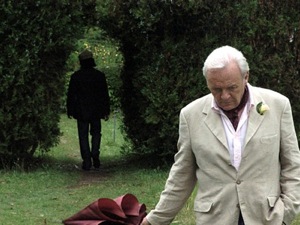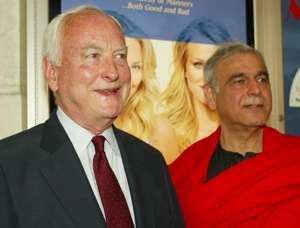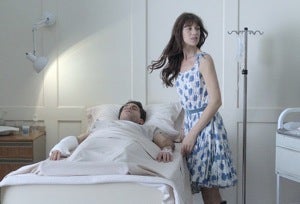For over four decades, director James Ivory and producer Ismail Merchant of Merchant Ivory Productions endured as one of the most respected and fruitful collaborations in cinema. In fact, their acclaimed adaptations of such novels as “A Room With a View,” “Maurice,” “Howard’s End” and ‘The Remains of the Day” virtually established a whole genre of filmmaking — “the Merchant Ivory film.”
Merchant died in 2005, but “The City of Your Final Destination,” which opens Friday, is his 24th collaboration with two-time Oscar winning screenwriter Ruth Prawer.
The film stars Omar Metwally as a young screenwriter who attempts to persuade the reluctant heirs of a celebrated Uruguayan novelist — including his gay brother (Anthony Hopkins), widow (Laura Linney) and young mistress (Charlotte Gainsbourg) — to allow him to write an authorized biography of the writer.
I’ll tell you exactly what happened. It was very tricky. They never bothered us while we were making the film — the problems began later.
We also felt that the ending wasn’t quite right, and ultimately we reordered the final scenes and it worked much better. But they wanted a focus group, and some of the questions on the cards were extraordinarily stupid, and then they wanted a big meeting with us to discuss the results.

They were going to, and Ismail picked up his briefcase and slammed it against the glass wall, which shattered. Then they went down to the street, and I stayed back. But the fight actually never happened, but it was all very dramatic.
Well, meanwhile we’d shown it to the stars, Paul Newman and Joanne Woodward, who loved it, and we explained to him that Harvey was trying to blackmail us over the money, and Paul said, “But I like the film the way it is – I don’t want him to change it.”
We didn’t speak for years, but then we patched things up over “The Golden Bowl.” But that, too, had a terrible denouement, with them trying to recut it and pulling all kinds of tricks at Cannes. We bought the rights back from Miramax for the U.S. and sold them instead to Lionsgate.

When I stop and think about it like that, it’s one of the more unlikely alliances. But then you never know what’s going to happen in Hollywood when you have to finance your films.
People say it’s getting harder and harder to raise money, but it’s always been hard for us. I can’t ever remember a time when it wasn’t. Yes, once we’d made “A Room With a View,” all the studios thought we had some magical formula that they could just tap into, but of course there’s no secret, no magical formula.
Yes, we even have cellphones in it! (Laughs) I always felt that it was basically a comedy, and a story about romance. But when we’ve screened it abroad, the audiences didn’t seem to know whether to laugh. It’s got serious themes, but it’s definitely a comedy.
Around $8 million, which isn’t very much these days.
(Laughs) I wish! It was actually very, very hard, and it was only after Ismail died that I realized just how much work he put into raising financing.
I felt very lucky that he read the script and immediately wanted to do it. And he brought a wonderful light touch to his character. I also felt very lucky with the rest of the cast – Omar, Charlotte, Laura — the only problem we ran into was with the little girl, played by Ambar Mallman. It took her a while to develop and relax, she was a little shy at the start, but once she did it was fine.
I think it’s fairly healthy. They’re always complaining about the state of the business, but a lot of movies are making a lot of money, and now 3D films are huge.

